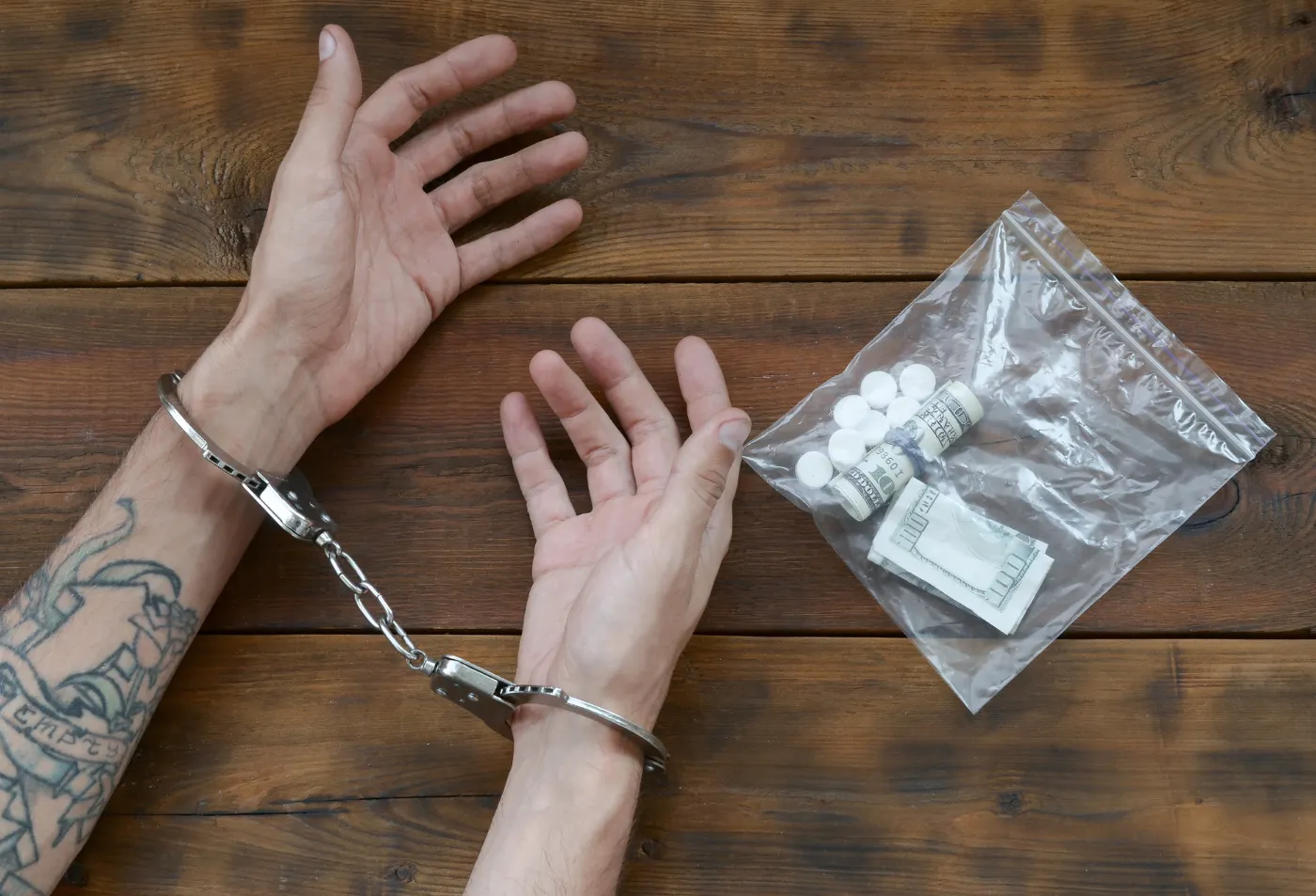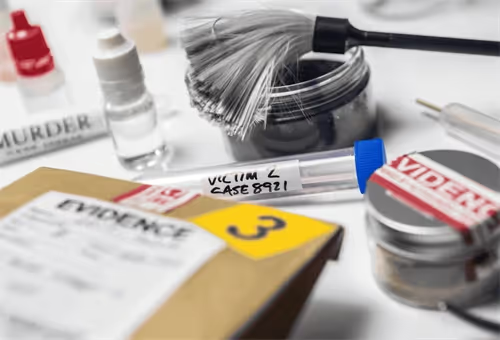Drug Manufacture

Facing Allegations of Illicit Drug Production?
Being charged with drug manufacture can have life-altering consequences. At Brightstone Defence, we have extensive experience in defending clients against these serious allegations. Our team can guide you through complex legal processes, ensuring your rights are protected. Key aspects of this charge include:
- Scope of involvement: Even assisting with parts of the production, such as mixing chemicals, preparing lab equipment, or supplying materials, can amount to manufacturing.
- Intent and knowledge: Prosecutors must prove you knowingly participated in producing a prohibited drug. Lack of awareness or duress may form the basis of a defence.
- Penalties: Depending on the drug type, quantity, and scale, penalties range from hefty fines to imprisonment of up to 15 years, or life in the case of large commercial operations.
If you are facing allegations of drug manufacture, it is essential to seek professional legal advice early. Our experienced lawyers at Brightstone Defence can review your case, identify potential defences, and represent you throughout the legal process.
Under NSW law contained in section 24(1) of the Drug Misuse and Trafficking Act 1985, drug manufacture refers to the process of producing, preparing, or synthesising illegal drugs. This could involve running a lab, mixing chemicals, or even just helping out with any step in the production of substances like MDMA, methamphetamine, or LSD. It’s not just “big operations”, even smaller scale home manufacturing falls under this offence.
Elements the Prosecution Must Prove
To convict someone of drug manufacture, the prosecution must show that:
- The person participated in the manufacture of a prohibited drug (actively or by helping)
- They knew or were reckless as to the fact that a prohibited drug was being made
- The substance produced is illegal under the Drug Misuse and Trafficking Act 1985 (NSW)
It’s not enough to be near the scene, you must be knowingly involved.
Possible Defences
Some legal defences that may apply include:
- Lack of knowledge – if the person didn’t know they were part of drug production
- Duress – they were forced or threatened to take part
- No actual drug – if the substance isn’t legally classified as a prohibited drug
- Mistaken identity – they weren’t the person involved
Each case is dependent on the specific facts and evidence making it essential to have a lawyer that is able to provide you with the most accurate legal advice for your case.
Potential Penalties
Penalties depend on the type and quantity of drug, and the scale of the operation, but as stated in section 24(1) of the Drug Misuse and Trafficking Act 1985 they can include:
- Up to 15 years imprisonment for all drugs except cannabis
- The maximum penalty is 10 years imprisonment for cannabis
- Face a maximum life imprisonment for large commercial quantities
- Hefty fines (hundreds of thousands)
- Criminal record, which can seriously impact future travel, employment, and study
Even minor involvement can have serious consequences.

Legal Process
& Options
Drug manufacture is prohibited under section 24(1) of the Drug Misuse and Trafficking Act 1985 and is one of the most serious drug-related offences. Whether you have been accused of orchestrating the drug lab, assisting in production, or supplying chemicals and equipment, these offences carry lengthy custodial sentences, especially if it relates to commercial quantities.
Pleading
Not Guilty
If you decide to plead not guilty and are acquitted, the charges will be dismissed, which is why it is important to obtain legal representation at an early stage. You may choose to plead not guilty if:
- You deny any involvement in the manufacture
- You did not know that there were drugs being produced on the property
- You did not know chemicals or equipment were for drug manufacture
- The lab was not yours and you did not have control over it
- The search or arrest was unlawful
Pleading
Guilty
Whilst pleading guilty may allow for a sentence discount of up to 25 per cent, a custodial sentence is highly likely, depending on the seriousness of the offence. Pleading guilty will mean that:
- You admit involvement in the importing and exporting of the substance
- You do not intend to dispute the quantity, your involvement, or the facts
The courts will consider various factors when sentencing, such as:
- The type and quantity of substance and the scale of the operation
- Whether you were the principal or a courier
- Risk to the public
- Your prior criminal history
- Whether you have demonstrated remorse, cooperated with authorities or taken steps to rehabilitation
Drug manufacturing cases often involve technical forensic evidence, covert surveillance, and complex legal issues; hence legal representation is essential in protecting your rights and options.
Gaol is uncommon for first-time, low-level drug possession, but it is still a possibility if:
- You have prior convictions
- You were in possession of a significant quantity
- There are aggravating factors
Yes, for small amounts, 15 grams or less, not more than 30 grams of dried cannabis and/or possession of the equipment used for cannabis, NSW Police can issue a Cannabis Caution.
The Cannabis Cautioning Scheme has been in place since 2000 and is operated by the NSW Police Force. The Scheme was developed in response to a NSW Drug Summit finding in 1999. Police exercise their discretion in appropriate cases and issue a caution as a police intervention to assist individuals to consider the legal and health ramifications of their cannabis use and to seek treatment and support.
However, for more serious cannabis offences, it is essential you seek immediate legal advice.
No, having physical possession of the drug is enough. You can be charged even if you were not planning to use the drug at the time.
Yes! Being a first-time offender to a drug offence may lessen the likelihood of going to jail, depending on your case. Section 21A of the Crimes (Sentencing Procedure) Act 1999 (3e) sets out the mitigating factors that the courts must take into consideration whilst sentencing. This includes whether the offender has a significant criminal record or none at all.
Methods that help first-time drug offenders avoid conviction include:
- Pursuing drug court programs
- Actively seeking rehabilitation
- Securing a section 10
- Submitting an apology letter to the court
- Presenting character references
However, seeking professional help is the best way to secure a positive outcome for your situation.
Yes, in some cases if there is no evidence of actual supply and you can demonstrate that the drugs were for personal use, your lawyer may be able to negotiate with the police or the prosecution to downgrade the charge to a possession charge.
Yes, deemed supply is treated seriously and you can be given a custodial sentence depending on the circumstances of your case. It is essential you seek legal advice to receive the best legal representation and outcome for your case.
Intent does not apply in the earlier stages of the charge, if you are found with more than the trafficable amount, the law automatically presumes intent to supply. You can challenge this presumption in court; your lawyer will be able to assist you in overcoming this presumption.
Deemed supply is when a person is presumed to be supplying drugs based on the quantity in their possession, even without evidence of distribution.
Actual supply relates to having direct evidence that the person supplied or intended to supply the illicit drugs. The proof needed for deemed supply is possession of a trafficable quantity, while actual supply requires evidence of intent or actions to supply, such as communications or surveillance.
Contained in Schedule 1 of the Drug Misuse and Trafficking Act 1985, it sets out a list of trafficable amounts per prohibited substance. The most common substances brought before the court are contained in the table.
The prosecution must prove beyond reasonable doubt that the accused was in possession of a drug greater than the trafficable quantity. If they cannot, section 29 of the Drug Misuse and Trafficking Act 1985 does not apply.
Being charged with deemed supply or involvement in any drug matter is serious. It is very important that you obtain immediate legal advice. We have a highly sought after track record of successfully defending deemed drug supply charges and drug matters.
Yes, even if there is no exchange of money, sharing or giving a prohibited drug is considered supply under NSW law.
Supply involves evidence of distribution or intent to distribute. Deemed supply applies when someone is caught with more than a trafficable quantity; the law presumes intent to supply without proof of actual distribution.
Intent can include messages arranging deals, possession of multiple resealable bags and scales, large amounts of unexplained cash, or presence in areas known for drug distribution.
Courts consider circumstances, criminal history, character, and mitigating factors. Low-level supply for first-time offenders rarely results in severe imprisonment; alternatives such as fines or community orders are often considered.
This is a tricky question. In 2006, the federal government passed legislation making it legal to cultivate cannabis for medicinal purposes if you obtain and have a licence. Even though cannabis can now legally be grown in Australia there are strict controls in place.
However, if you do not obtain a licence, it is a serious criminal offence as set out in the Drug Misuse and Trafficking Act. It remains a criminal offence to grow cannabis in NSW outside of the federal licensing scheme.
Medicinal use in NSW is subject to the federal licensing scheme and it has subsequently introduced a Medicinal Cannabis Compassionate Use Scheme.
Yes, you can. If you are the owner of a property, tenant, or person in control of a property where cultivation occurs of a prohibited drug, you may be criminally responsible under NSW legislation. If there has been drug cultivation on your property and you were not involved, it is essential to seek appropriate legal advice.
Yes, even if the plants are not yours, cultivating on behalf of another person is still a serious offence. Assisting or facilitating cultivation is treated as joint criminal responsibility under NSW legislation.
It depends. In the instance that a landlord knowingly allows cultivation on their property and takes no action, they may be charged with permitting the use of the premises for drug offences as contained under section 36A of the Drug Misuse and Trafficking Act 1985.
Importing and exporting prohibited drugs are primarily a Commonwealth offence under the Criminal Code Act 1995 (Cth), making it a federal offence. However, it is common for NSW law enforcement authorities to investigate and prosecute in conjunction with federal agencies such as the Australian Federal Police (AFP) and Australian Border Force (ABF).
Lack of knowledge may be a defence to your case and the prosecution must prove intent or recklessness. If you knew or were wilfully blind, you can still be found guilty. Hence it is essential to seek good and accurate legal advice to help you with your situation.
Delivery packages are scanned and intercepted by the Australian Border Force (ABF). If drugs are found, you may be tracked and arrested during delivery. Drug importation through the course of mail couriers is treated the same as any other form of drug importation.
Yes. Importing or exporting prescription drugs without proper authorisation is illegal. A permit from the Therapeutic Goods Administration (TGA) or Australian Border Force (ABF) is necessary, depending on the drug. You must comply with the Australian Customs Act 1901 and other related legislation to ensure the safe and legal transfer of prescription drugs.
For personal use, certain prescription medications may be allowed to be imported or exported, but they still require proper authorisation. You will need to provide evidence that the medication is for personal use, such as a doctor’s prescription. Additionally, the amount should be reasonable for personal consumption and comply with the import/export limits.
Yes, there are strict restrictions on bringing any type of drug into NSW from overseas. Drugs such as cannabis, opioids, and other illicit substances are prohibited. Even prescription medications can be restricted if they contain controlled ingredients. Customs will inspect and seize any drugs brought into the country without appropriate permits or licences.
Individuals who are not commercial entities may still be subject to the same legal requirements for importing or exporting drugs. This includes needing permits and complying with relevant laws, even if the shipment is for personal use. Unauthorised shipments are illegal and may result in severe legal consequences.
Legally, manufacturing a prohibited drug typically refers to being included in the production. This could include, for example, going to a friend’s house and helping him operate a pill press, or buying an at-home kit and making your own MDMA at home.
No, it can also include any steps that are part of the production process. Even partial steps like mixing precursors, assembling lab equipment, or preparing ingredients with the intent to manufacture a prohibited substance.
No, even on a small scale it is illegal. It is a criminal offence under section 24(1) of the Drug Misuse and Trafficking Act 1985 (NSW) that drug manufacturing is illegal, regardless of the scale and quantity.
Absolutely. Prosecutors need to prove that there was intent to produce a prohibited drug. Mere possession of certain chemicals or tools without intent may not meet the legal definition of manufacturing. However, in any circumstance it is essential to have a strong legal professional to help in differentiating your involvement.
Precursor substances are substances that are used to make prohibited drugs in NSW. NSW law restricts the unauthorised possession of certain precursors such as pseudoephedrine if they are intended for manufacturing of illegal drugs.
The full list of prohibited drugs is contained in Schedule 1 of the Drug Misuse and Trafficking Act 1985 (NSW). Common examples are:
- Methamphetamine; also known more commonly as ice
- MDMA; also known more commonly as ecstasy
- Heroin
- Cocaine
- LSD
- Synthetic cannabinoids
- Cannabis; and cannabis oils
- Yes.
It is essential to seek legal advice immediately if you are accused of any drug offence. A skilled criminal defence lawyer can explain the charges, assess the evidence, identify possible defences, and represent you in court to protect your rights and achieve the best possible result.
Yes. Under section 29 of the Drug Misuse and Trafficking Act 1985, if you are found with more than the trafficable quantity, the law presumes intent to supply unless proven otherwise.
Yes. For small amounts (15 to 30 grams of dried cannabis), NSW Police may issue a Cannabis Caution.
The Cannabis Cautioning Scheme:
- Has been in place since 2000
- Is operated by the NSW Police Force
- Was developed after the 1999 NSW Drug Summit
Police have discretion to issue a caution, encouraging legal awareness and health support.
For more serious offences, seek legal advice immediately.
Legally, manufacturing a prohibited drug typically refers to being included in the production. This could include, for example, going to a friend’s house and helping him operate a pill press, or buying an at-home kit and making your own MDMA at home.
No, it can also include any steps that are part of the production process. Even partial steps like mixing precursors, assembling lab equipment, or preparing ingredients with the intent to manufacture a prohibited substance.
No, even on a small scale it is illegal. It is a criminal offence under section 24(1) of the Drug Misuse and Trafficking Act 1985 (NSW) that drug manufacturing is illegal, regardless of the scale and quantity.
Absolutely. Prosecutors need to prove that there was intent to produce a prohibited drug. Mere possession of certain chemicals or tools without intent may not meet the legal definition of manufacturing. However, in any circumstance it is essential to have a strong legal professional to help in differentiating your involvement.
Precursor substances are substances that are used to make prohibited drugs in NSW. NSW law restricts the unauthorised possession of certain precursors such as pseudoephedrine if they are intended for manufacturing of illegal drugs.
The full list of prohibited drugs is contained in Schedule 1 of the Drug Misuse and Trafficking Act 1985 (NSW). Common examples are:
- Methamphetamine; also known more commonly as ice
- MDMA; also known more commonly as ecstasy
- Heroin
- Cocaine
- LSD
- Synthetic cannabinoids
- Cannabis; and cannabis oils
- Yes.
It is essential to seek legal advice immediately if you are accused of any drug offence. A skilled criminal defence lawyer can explain the charges, assess the evidence, identify possible defences, and represent you in court to protect your rights and achieve the best possible result.
SUCCESS CASES & ARTICLES
Brightstone Defence delivers focused criminal defence services year-round and has built a strong track record of successful outcomes.
Meet our lawyers
WORLD CLASS
REPRESENTATION
100+ 5 Star Reviews
Personalised legal strategies tailored to each case
Recognised leaders in criminal defence law
Free initial consultation and case evaluation
Proven success in high-stakes and complex cases
Get AN instant estimated Quote
and a free consultation session
Facing criminal charges? Our experienced criminal defence lawyers are here to help. Book your free consultation now to discuss your case and understand your options.










